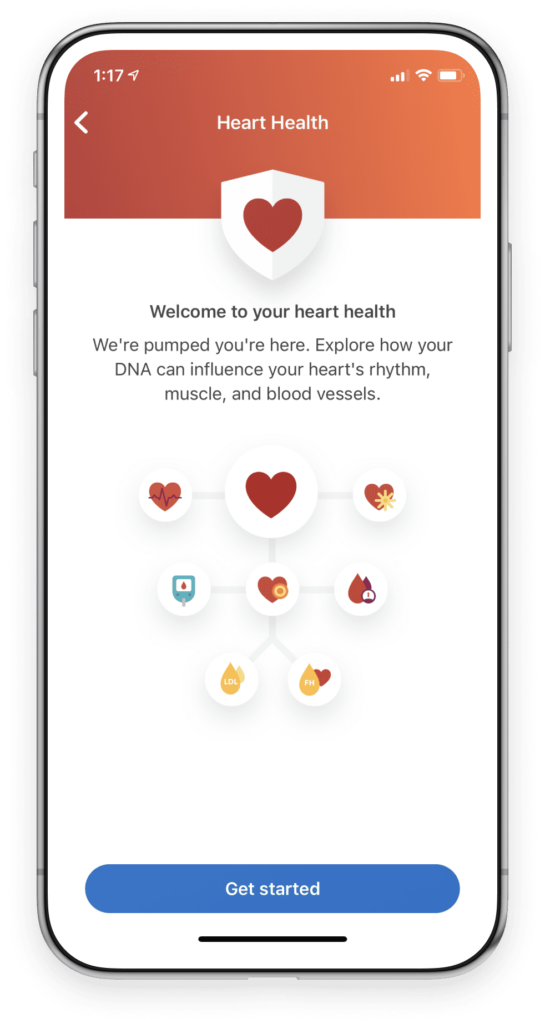Editor’s note: Since we last posted this we’ve added two new health reports and so we’ve updated this post for Heart Health Month 2022.
February is American Heart Month: a time to learn about heart disease and healthy lifestyle actions you can take to prevent it.
Heart disease is responsible for over 600,000 deaths in the U.S. each year making it the leading (non-pandemic) cause of death in the U.S. Heart disease includes a number of different conditions that relate to your heart’s rhythm, muscle, and blood vessels. Luckily there are things we can all do to lower our risk for, or even prevent heart disease. Learning about what your genetics can tell you about your heart, can be a good first step.
Explore Heart Health
23andMe Health + Ancestry Service offers a number of reports* on heart-related conditions to explore:
- Familial hypercholesterolemia (FH) is a genetic condition associated with very high levels of cholesterol in the blood, specifically low-density lipoprotein (LDL), or “bad” cholesterol. High cholesterol due to FH increases the risk for early cardiovascular disease, which can lead to a heart attack.
- TTR-related hereditary amyloidosis is a genetic condition caused by the buildup of a protein called transthyretin in the body’s tissues and organs. This protein buildup, called amyloidosis, can damage different parts of the body including the heart, which can lead to heart failure.
- Type 2 diabetes: In type 2 diabetes, sugar builds up in the blood, which over time can lead to complications like heart disease and stroke. This report is powered by 23andMe Research and can tell you about your genetic chances of developing this condition.

Looking to Go Deeper
For those who want to explore, even more, we offer 23andMe+, an annual membership with 10+ exclusive reports and features delivered to you throughout the year. Some of those exclusive reports, powered by 23andMe Research, include heart-related conditions to explore:
- Atrial fibrillation is a common type of irregular heartbeat. It occurs when the two upper chambers of the heartbeat irregularly. People with atrial fibrillation have a higher risk for blood clots, stroke, and heart failure.
- Coronary artery disease is a type of heart disease that is typically caused by the buildup of a waxy, cholesterol-containing substance called plaque inside the coronary arteries, which are the major blood vessels that supply the heart with oxygen-rich blood. When plaque builds up in the coronary arteries, the vessels narrow, and blood flow to the heart is decreased.
- High blood pressure, also called hypertension, is when the blood puts too much pressure on the walls of blood vessels, which can lead to heart disease, stroke, and other health problems.
- HDL cholesterol, the so-called “good cholesterol,” higher levels of high-density lipoprotein, HDL, are associated with a lower risk for heart disease. That’s because HDL acts like an arterial cleanser, removing cholesterol from blood vessels and taking it back to the liver for its removal from the body. This helps prevent LDL cholesterol from building up on the walls of blood vessels and restricting blood flow.
- LDL cholesterol, or “bad cholesterol” can increase your risk for heart attack or stroke. This report can tell customers who don’t have a genetic variant detected in their Familial Hypercholesterolemia Genetic Health Risk report, about their chances of having high levels of “bad” cholesterol.
- Triglycerides — a type of fat, or lipid, that the body uses to store energy from food for future use. High triglyceride levels are associated with an increased likelihood of developing heart disease, stroke, and sometimes pancreatitis.
Learning more about your genetics can help by raising your awareness of certain heart-related conditions. But it’s also important to keep in mind that things like your family history, ethnicity, and age can also affect your chances of developing these conditions.
Knowing about your genetics isn’t the end. Taking healthy actions to lower blood pressure, cholesterol and blood sugar can help lower your risk for heart disease. For many heart-related conditions, your everyday actions play a big role in your overall chances of developing (or developing serious complications from) the condition. Maintaining a healthy weight, getting regular exercise, and eating a heart-healthy diet are some of the recommended ways to keep our hearts healthy. This American Heart Month, think about any new actions you can take to keep your heart beating its best.
*23andMe health predisposition reports include both reports that meet FDA requirements for genetic health risks and reports which are based on 23andMe research and have not been reviewed by the FDA. The test uses qualitative genotyping to detect select clinically relevant variants in the genomic DNA of adults from saliva for the purpose of reporting and interpreting genetic health risks. It is not intended to diagnose any disease. Your ethnicity may affect the relevance of each report and how your genetic health risk results are interpreted. Each genetic health risk report describes if a person has variants associated with a higher risk of developing a disease, but does not describe a person’s overall risk of developing the disease. The test is not intended to tell you anything about your current state of health, or to be used to make medical decisions, including whether or not you should take a medication, how much of a medication you should take, or determine any treatment. For important information and limitations regarding each genetic health risk report, visit 23andme.com/test-info/.



